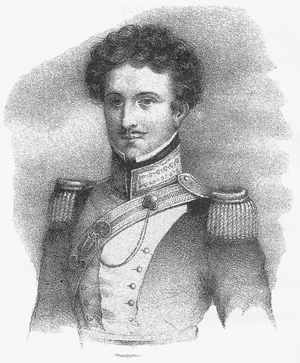An Expedition of Discovery into the Interior of Africa, Through the Hitherto Undescribed Countries of the Great Namaquas, Boschmans, and Hill Damaras Performed under the Auspices of Her Majesty’s Government, and the Royal Geographical Society. . . . 2 vols. London: Henry Colburn, 1838.

It is earnestly to be hoped that extended intercourse with the natives beyond the Orange river will result from this expedition, for their benefit and for that of our colonists; and that from the Cape, the blessings of civilization and religion will proceed by degrees, towards the Mountains of the Moon.
—Alexander (Vol. 2, p. 256)
An eldest son, Alexander exhibited leadership qualities at an early age and spent most of his life in the British military. In what is now South Africa, he served as aide-de-camp to Governor Benjamin D’Urban in the Kaffir War of 1835. Afterward, he undertook a twelve-month, round-trip expedition north from Cape Town through the western interior, to a latitude of 23°. His small party consisted of seven companions—four Europeans and three natives—and an ox-drawn wagon stocked with expedition supplies, bartering items, and scientific equipment. They left Cape Town on 6 September 1836, passing through territory of the Great Namaquas and Boschmans, and by April reached their northernmost point, on the coast at Walvisch Bay (today’s Walvis, Namibia). From there, they headed east into the land of the Hill Damaras and then returned via a slightly more easterly southern route. All who had started the trek arrived safely in Cape Town on 21 September 1837. During their 3900-mile journey, the men had collected numerous specimens of plants, birds, and mammals, and Alexander had taken useful notes on the activities of the colonists and the native tribes he had encountered. He was subsequently knighted for these exploratory efforts.
From Africa, Alexander’s military duties took him to the Crimea and New Zealand. He is credited with saving Cleopatra’s Needle from destruction and was instrumental in its transfer from Egypt to England in 1877. On 1 July 1881 he received the honorary rank of general.